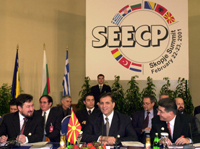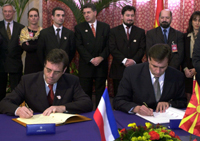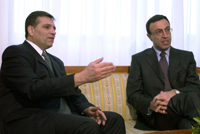Enter content here ADDRESS BY PRESIDENT BORIS TRAJKOVSKI AT SEECP SUMMIT. MIA 
"I am pleased to point out that the achievements of the South East European Cooperation Process are very encouraging so far. The most valuable one is that during the last decade when we faced numerous problems, the countries within the Process have proved able to exchange views through an open dialogue in endeavouring to find solutions to issue important for the whole region. I am convinced that the Process in the future will continue to affirm its unique value," President Trajkovski said, opening the fourth SEECP Summit.
He reminded that in the course of the past year we initiated many useful and intense activities. Many meetings were held at all levels where several joint documents were adopted.
"Shortly after the democratic changes in the FRY with the informal Summit and the adoption of the Skopje Declaration, we gave a unanimous and clear support to the new democratic leadership of this country and we have taken the political decision for its return in the Process," Trajkovski said.
"I consider that today with the formal return of the Federal Republic of Yugoslavia and with full membership of Bosnia and Herzegovina, new prospects are opened for further strengthening of cooperation within the Process. This gives to the Process even greater importance in the future development of the region. We are all aware of the need to develop regional cooperation. But we are also aware that it could not substitute or be an alternative to our commitment and need for EU membership. These processes are complementary. We all agree that the regional integration will follow only if the region is offered a clear European prospective," Macedonian President stressed.
He said that the Republic of Macedonia dedicates significant attention to the development of good neighbourly relations and to the fostering of regional cooperation. "Within this framework special importance is given to the Co-operation Process - as an authentic regional framework that was created by states of the region. We are fully committed to the achievement of the objectives contained in the Charter on Good Neighbourly Relations, Stability and Cooperation in South Eastern Europe and we are convinced that their further implementation will give a significant contribution to peace, as a precondition for prosperity in this part of Europe. Regional problems need regional solutions. It is in this context that I see the functional integration as a true opportunity for us," he added.
According to him, our strategy for regional cooperation should start by defining our common and regional issues. "Most of our countries share the same problems, which requires state level approach. Therefore, I think that the co-operation in all areas will be significantly improved and will have a considerable impact by organising sectorial ministerial meetings, as permanent cooperative bodies. The regional integration before all, is cooperation among functioning states, as a basic precondition for success," Trajkovski said.
"We are pleased that the indispensable reforms are constantly progressing despite the hardships. This path will be shorter and easier if we are together. Therefore we understand that it is time for our Process to develop new types of co-operation. Besides the political ones it is necessary to develop intense economic cooperation. In that regard, the Action Plan and Economic Forum will definitely contribute to the promotion of economic co-operation in South Eastern Europe. The infrastructure and energetic interconnection in the region will give an impulse to further economic development. The best way to establish our interdependence is through common markets of energy and communication," Trajkovski emphasised.
"The Stabilisation and Association Process, established by the EU opened a clear perspective for the future of the South East European countries. The Republic of Macedonia by initialling the Stabilisation and Association Agreement has accepted the responsibility to fulfill the obligations resulting from its rapprochement to the EU. In that regard, we reaffirm our strong commitment for further strengthening of democracy, reforms and cooperation, which will allow a more rapid rapprochement of each country included in the Stabilisation and Association process towards the EU," Trajkovski said.
He said that the rapid integration in the European and Euro Atlantic structures would result in overall political, economic and social development of our countries. In this way the EU will give its utmost contribution to the stability and prosperity of the region and the whole of Europe.
"The Stability Pact remains one of the most concrete instruments. We fully support the Pact since its objectives fully correspond to our efforts to enter the European and Euro Atlantic structures and further develop regional cooperation," Trajkovski said.
Speaking about the position of the Republic of Macedonia regarding some issues important for the security, stability and cooperation in our region, he reminded that at the informal Summit in October last year we were pleased to state that, thanks to the clearly expressed will of the people, changes occurred in the FRY which had a positive influence upon the situation in the region. "Today we can welcome the measures that it is undertaking in carrying out the structural reforms in their society, towards rapid development of democratic processes and towards reconciliation of social and national groups. We also welcome the commitment of the Yugoslav authorities to respect the provisions of the UN Security Council Resolution 1244," Trajkovski said.
"For several months now, the situation in Southern Serbia has been deteriorating. There have been several serious attempts to establish a dialogue in order to find a peaceful solution but they have failed. Instead, the violence and the illegal actions of extreme armed groups have continued and the conflict is escalating. We severely condemn the most recent terrorist attacks. We encourage the international community to continue with its efforts in establishing democratic institutions in Kosovo, introducing order and rule of law," Trajkovski stressed.
According to him, every attempt to make a serious analysis and give a concept for the stabilisation of the region must start from two basic postulates. "First, we must put an end to all types of ethnically motivated violence. Militant extremism directly strikes the roots of all attempts for a peaceful resolution of disputes, through a political dialogue. In a very short period of time violence can transform tolerance, built patiently for so many years, into a destructive hatred. Therefore, I am convinced that all factors in the region, including the international community, must show a high level of awareness and determination in stopping militant extremism", Trajkovski said.
"I base the second postulate on the century-long historical experience and the memory of the people of the region. Our region is a true mosaic of various value systems, cultures, religions, languages and ethnic groups. Ethnic boundaries cannot be part of the solution. We must build states of individuals not states of ethnic groups. The lasting solution in the region must lean on the principles against forceful changing of the borders, the support of the integrity and integrating processes within states, rapid integration of the states in European and Euro Atlantic structures and the economic reconstruction of the region," Trajkovski stressed.
Addressing the present guests, President Trajkovski mentioned an issue that has a multiple and lasting importance for us. "Because of the difficulties during the transition period and because of the last Balkan war, the region is again becoming a transit corridor for illegal traffic of drugs, weapons and people. In addition crime is organised regardless of the borders, supported by corruption. These phenomena threaten our security, the development civil society and democracy. Therefore, it is necessary on the national level to undertake systematic measures in the fight against these evils. But, being aware of the cross border dimension of these issues, it is necessary to establish co-operation on regional and even global level. In that regard, I would like to express the strong commitment of my country to fight against these illegal activities by intensifying and fostering joint cooperation, with the active participation of the international community," President Trajkovski said.
At the end of his address, President Trajkovski said, "As leaders we have a great responsibility above all before our nations. Second we are also responsible before our neighbours. And ultimately before Europe, as a community of democracies where all our wishes and obligations converge. We must fulfil this huge responsibility that we have towards the ideal of our citizens, towards our countries, towards our common ideal of united Europe through new forms of co-operation," Macedonian President Boris Trajkovski said. TRAJKOVSKI AND KOSTUNICA SIGN AGREEMENT ON BORDER DEMARCATION. MIA 
Within the SEECP Summit, Macedonian and Yugoslav Presidents, Boris Trajkovski and Voislav Kostunica, signed the Agreement on Macedonian - Yugoslav border demarcation.
"I am very glad to sign the Agreement in front of the Macedonian and International public, as it is an expression of the positive will of the residents from the both countries. The border issue disturbed our relations and cooperation therefore we are satisfied that the agreement was reached within 2 months. This signature is an expression of the positive political will, good intentions and commitment to solve the current problems," Trajkovski stated.
"With this Agreement we do not want our citizens to be divided by the border. On the contrary, it would open new perspectives for communication. We showed that we are prepared to contribute to the stability and better cooperation in the region. We confirmed our determination for European future," Trajkovski explained.
"The signing of the Agreement emphasized the good political and economic relations between Macedonia and Yugoslavia as well as the continuation of traditionally good relations between the two nations," Kostunica stated.
"The Agreement would mean enhancement of the peace, stability and cooperation on the Balkans, as an integral part of Europe. It also suggests that the borders should be firm and unchangeable, but open in the same time," Kostunica explained. SKOPJE-FORUM. BTA 
Nadezhda Mihailova: All Countries in SEE Have Embraced
Europe's Democratic Values
For the first time, all countries of Southeastern Europe have embraced the European democratic values and criteria, Bulgarian Foreign Minister Nadezhda Mihailova told her counterparts of Southeast Europe at an informal meeting here on Thursday evening. The foreign ministerial precedes a meeting of the heads of state and government of the Southeastern Europe Cooperation Process (SEECP) to be held here on Friday.
Mihailova said in her address that SEECP needs further institutionalization. She believes that cooperation should become more effective by expanding dialogue to the level of parliaments, ministries and other state and government institutions. According to her, attention should now be focused on specific projects, including those for combatting organized crime and illegal trade in drugs, arms and people. She stressed the importance of the situation in southern Serbia. All foreign ministers agreed that this matter should be given due attention at the Friday summit. "It is Bulgaria's understanding that the problem should be resolved by peaceful means," Mihailova said
stressing that all SEECP countries are involved in the efforts to find a solution. She suggested that "the Troyka" format is used in future cooperation and in the efforts to solve regional problems within SEECP. She supported the idea that the SEECP presidency is passed over from Macedonia to Yugoslavia and then to Albania. Greek Foreign Minister Georgios Papandreou congratulated Mihailova for her country's successful campaign to be stricken off the EU visa blacklist. Yugoslav Foreign Minister Gorav Svilanovic stressed how quickly Belgrade managed to normalize its position at SEECP. He described as a success story the agreement between Belgrade and Sofia to solve the bilateral visa problem by signing a readmission accord. On Friday Mihailova will join President Peter Stoyanov and the other members of the Bulgarian delegation to the SEECP summit. PRESIDENT-SKOPJE-BILATERAL MEETINGS. MIA 
Macedonian President Trajkovski to Visit Bulgaria in May, Two Bilateral Documents under Preparation
Macedonian President Boris Trajkovski will visit Bulgaria in May, it emerged after a meeting between Trajkovski and Bulgarian President Peter Stoyanov. Two bilateral documents are under preparation for the visit: a Declaration of Friendship and a Readmission Agreement, Stoyanov's Press Secretary Neri Terzieva said. Stoyanov and Trajkovski talked in Skopje on Friday before the official opening of the fourth summit of the countries participating in the South East European Cooperation Process. Stoyanov talked with Javier Solana, the EU High Representative for Common Foreign and Security Policy. The two state leaders expressed concern over the delayed implementation of projects involved in the construction of Transport Corridor VIII, Terzieva said. Stoyanov and Trajkovski will propose a Bulgaria-Macedonia-Albania meeting on the matter. Stoyanov will voice his concern over the delayed construction of Corridor VIII at a meeting with Bodo Hombach, Special Coordinator of the Stability Pact for South Eastern Europe, later on Friday.
Stoyanov and Solana discussed the situation in Southern Serbia with concern. If conflicts like this one persist, the idea of European Balkans will grow more distant, according to Solana. The lifting of the visa restriction on Bulgarians travelling in the Schengen area was also on the agenda. Solana assured the Bulgarian President he would do his best to have visas scrapped as early as possible. Stoyanov expressed Sofia's gratitude for Solana's active role in its removal from the visa blacklist. BULGARIA-SKOPJE SUMMIT-BULGARIAN PRESIDENT-SPEECH. MIA President Stoyanov: Armed Groups' Actions in Southern Serbia Undermine Effect of Kosovo Local Elections
The actions of ethnic Albanian armed groups in Southern Serbia undermine the effect of the local elections in Kosovo and cast doubt on the legitimacy of the Kosovo Albanian leaders, Bulgarian President Peter Stoyanov said on Friday, addressing the fourth summit of the countries participating in the South East European Cooperation Process (SEECP). He addressed the first plenary session of the forum devoted to the prospects for further strengthening of goodneighbourly relations, stability, security and cooperation in Southeastern Europe. Stoyanov laid emphasis on the situation in Southern Serbia. He called the events in that region "the most alarming component of the situation in the last few months". "We denounce the violent unlawful actions of the ethnic Albanian armed groups, which jeopardize the efforts of the international community to solve the Kosovo problem," Stoyanov said.
The armed groups in Southern Serbia undermine the efforts of the international community, including those of the countries of the region, to stabilize the situation in Kosovo and to provide assistance in creating a multiethnic society, the Bulgarian President said. Stoyanov called on the participants in the summit to support again the UN Security Council's appeal for immediate cessation of violence in Southern Serbia. The countries involved must show maximum restraint and iron out their differences at the negotiating table, he said.
"We must state our clear resolve that ethnic divisions will no longer be allowed to prevail in the Balkans and that armed conflicts will be headed off," Stoyanov said. Stoyanov hailed the contact established between the United Nations Interim Administration Mission in Kosovo (UNMIK) and the state leadership of the Federal Republic of Yugoslavia. He said this was the way to end conflicts and launch constructive dialogue for the settlement of this ethnic, constitutional and political issue.
The Bulgarian President stressed the need for NATO's continued presence in Kosovo, despite the political changes in Yugoslavia. KFOR will remain a major factor of stability in the Western Balkans for a long time, Stoyanov said. The situation in Bosnia-Herzegovina, which will now officially join SEECP as a full-blood participant, gives grounds for optimism, according to Stoyanov. Yugoslavia's forthcoming accession to the SEECP Charter will send a new positive signal about stability, security and goodneighbourly relations in the region.
At the end of his address, Stoyanov expressed optimism about the European future of the Balkans, which is being built now despite the numerous challenges. "Never before in history has this part of the world had better prospects of building its future on the basis of the common goals, aspirations and values upheld by the countries of the region," Stoyanov said. He noted that there is no Balkan country not sharing the European values now. BALKAN SUMMIT HEADED FOR CLASH? () Macedonian President Boris Trajkovski opened the Balkan summit's first full day of work on 23 February, dpa reported. Heads of state or government from Albania, Bosnia-Herzegovina, Bulgaria, Greece, Macedonia, Romania, Turkey, and Yugoslavia are taking part, as well as an "observer" from Croatia. The EU's Chris Patten, Javier Solana, and Bodo Hombach are representing the international community. It is not clear whether Washington or Moscow are represented. Albanian President Rexhep Meidani canceled his plans to attend "at the last minute" but did not give a reason, Deutsche Welle reported. Prime Minister Ilir Meta is representing Albania. The state-run Serbian news agency Tanjug reported that Albania may not sign the final declaration, which condemns the activities of Albanian terrorists in southern Serbia. Balkan summits usually put on a show of unanimity before the general public, issuing declarations that include only the lowest common denominator of agreement. BALKANS-POLICE COOPERATION. --- Police Officers Exchange Expertise at Regional Seminar
At a seminar in Sofia Friday top police officers from Bulgaria, Croatia, Slovenia, Romania, Bosnia and Herzegovina, Macedonia and Albania discussed ways to improve police cooperation in the region. The seminar is part of a project for regional training and assistance to Central and Southern Europe supported by the Royal Canadian Mounted Police. The project is being implemented by the Canadian government within the Stability Pact for Southeast Europe. So far, eight seminars have been held; the current one is the last one of a series dedicated to regional cooperation. The discussions were attended by police directors and chiefs of operative and administrative police services from the seven countries of the region. Lecturers from Canada acquainted the attendees with their professional experience. The discussion focused on improving the contacts between the police structures in the fight against tranborder organized crime. |



